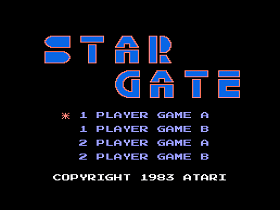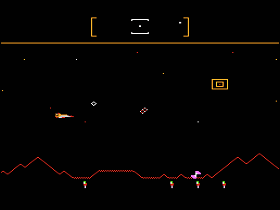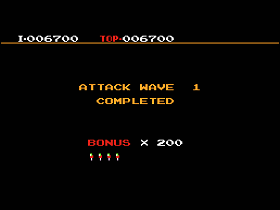 The Game: The alien abductors are back. Their henchbeings are back. And fortunately for the hapless humans on the planet’s surface, you’re back too, in a fully armed warship with a belly full of smart bombs. But the aliens have brought new and unusual reinforcements, and now the ultimate X-factor is seen visibly floating in the night sky – a stargate which could deposit your space fighter anywhere, delivering you to safety…or a rendezvous with a swarm of aliens. (Atari, 1983)
The Game: The alien abductors are back. Their henchbeings are back. And fortunately for the hapless humans on the planet’s surface, you’re back too, in a fully armed warship with a belly full of smart bombs. But the aliens have brought new and unusual reinforcements, and now the ultimate X-factor is seen visibly floating in the night sky – a stargate which could deposit your space fighter anywhere, delivering you to safety…or a rendezvous with a swarm of aliens. (Atari, 1983)
Memories: Released only in Japan in the initial burst of titles for the Famicom, this port of Williams Electronics‘ arcade sequel Stargate (also known as Defender II, a title to which the game was switched to reinforce its status as a sequel to the hit Defender). The territory-limited reach of the game is the bad news. The good news? It’s an exceptional arcade port that might just have become this reviewer’s favorite way to enjoy a legendarily difficult game.
 What’s so special about the Famicom port of Stargate? The secret is in simplifying the control scheme. Both Defender and Stargate, in the original arcade incarnations, featured joysticks restricted to vertical movement only, while “reverse” buttons governed which direction the player’s ship faces, and “thrust” controlled the speed of the player’s ship across the game’s simple mountainous skyline. In the arcade, that control scheme set a fairly high bar to entry for potential Stargate jockeys: without supreme coordination (and memorization of the control layout). For Defender and Stargate aces, Pac-Man and Donkey Kong were too simple.
What’s so special about the Famicom port of Stargate? The secret is in simplifying the control scheme. Both Defender and Stargate, in the original arcade incarnations, featured joysticks restricted to vertical movement only, while “reverse” buttons governed which direction the player’s ship faces, and “thrust” controlled the speed of the player’s ship across the game’s simple mountainous skyline. In the arcade, that control scheme set a fairly high bar to entry for potential Stargate jockeys: without supreme coordination (and memorization of the control layout). For Defender and Stargate aces, Pac-Man and Donkey Kong were too simple.
For the rest of us, well, we were missing out on the fun. The Fammicom port solves that: control of the ship is done entirely with the D-pad, a much more  intuitive way to handle the player’s ship. The fluidity of control with this method actually does something for Stargate that may be missing for arcade gamers who aren’t also concert pianists: it makes it fun rather than just punishingly difficult. And isn’t that what games are meant to be?
intuitive way to handle the player’s ship. The fluidity of control with this method actually does something for Stargate that may be missing for arcade gamers who aren’t also concert pianists: it makes it fun rather than just punishingly difficult. And isn’t that what games are meant to be?
Sadly, Stargate remains an incredibly obscure specimen of a unique third-party Famicom software push by Atari itself, which never had much luck in the Japanese market (other than seeing a record number of its games pirated overseas). At the same time its Atarisoft imprint was turning out ports of games to which Atari held home game rights, Atari also tried to get a piece of the Famicom action,  turning out only two games – Stargate and Millipede – before deciding that it couldn’t take on the burgeoning Japanese video game market on its home turf. That can only be considered, in hindsight, a pity given how this game turned out.
turning out only two games – Stargate and Millipede – before deciding that it couldn’t take on the burgeoning Japanese video game market on its home turf. That can only be considered, in hindsight, a pity given how this game turned out.